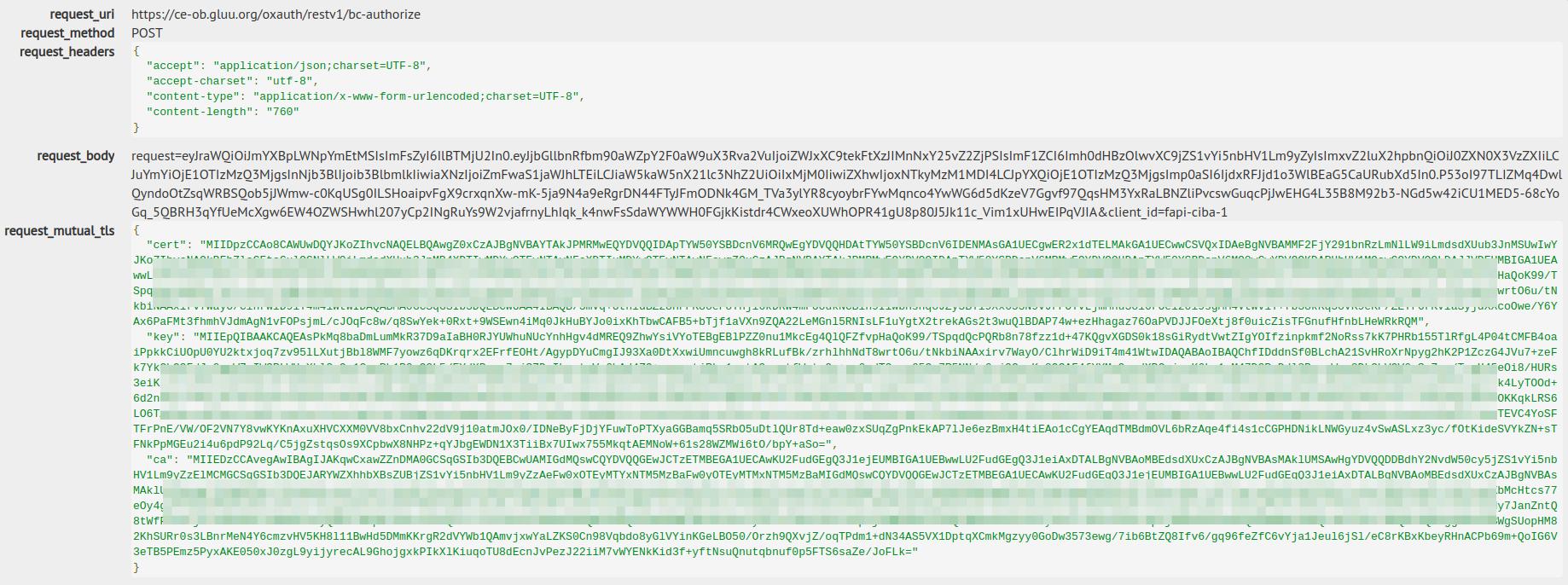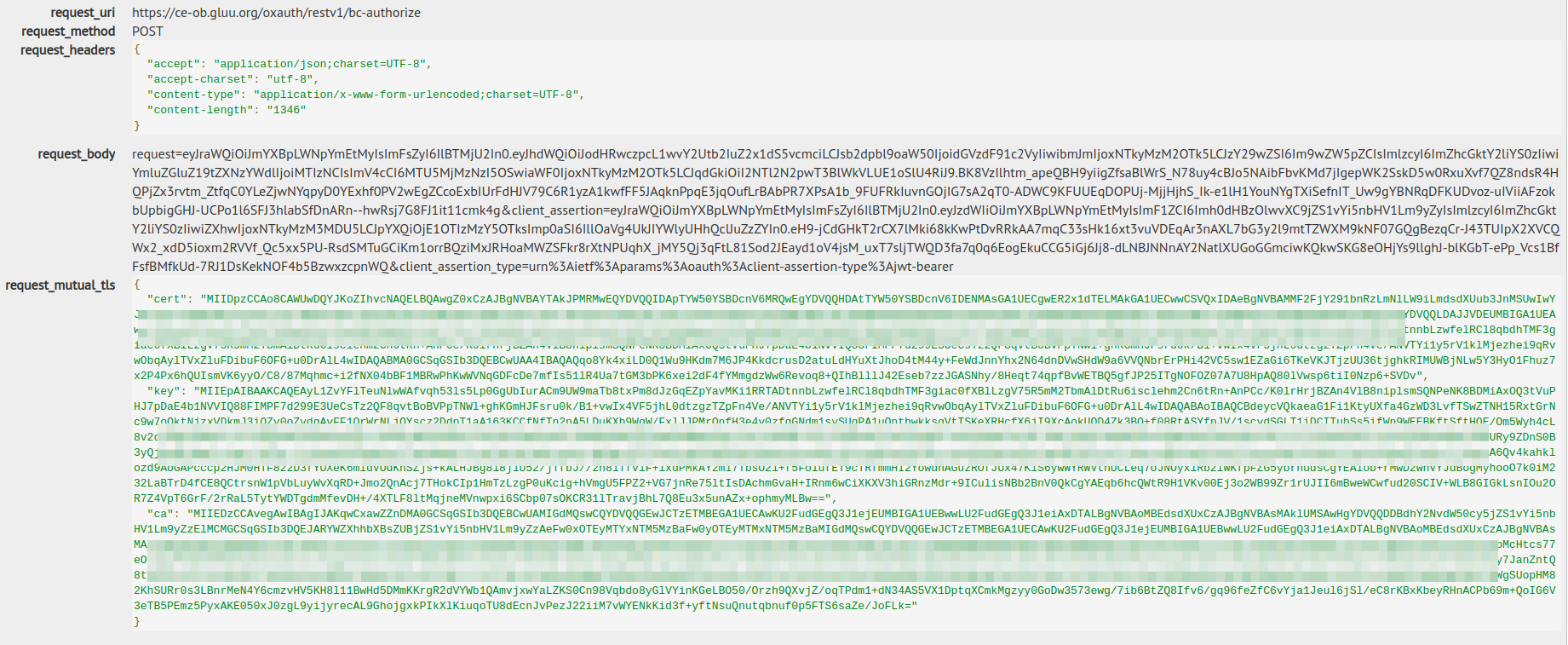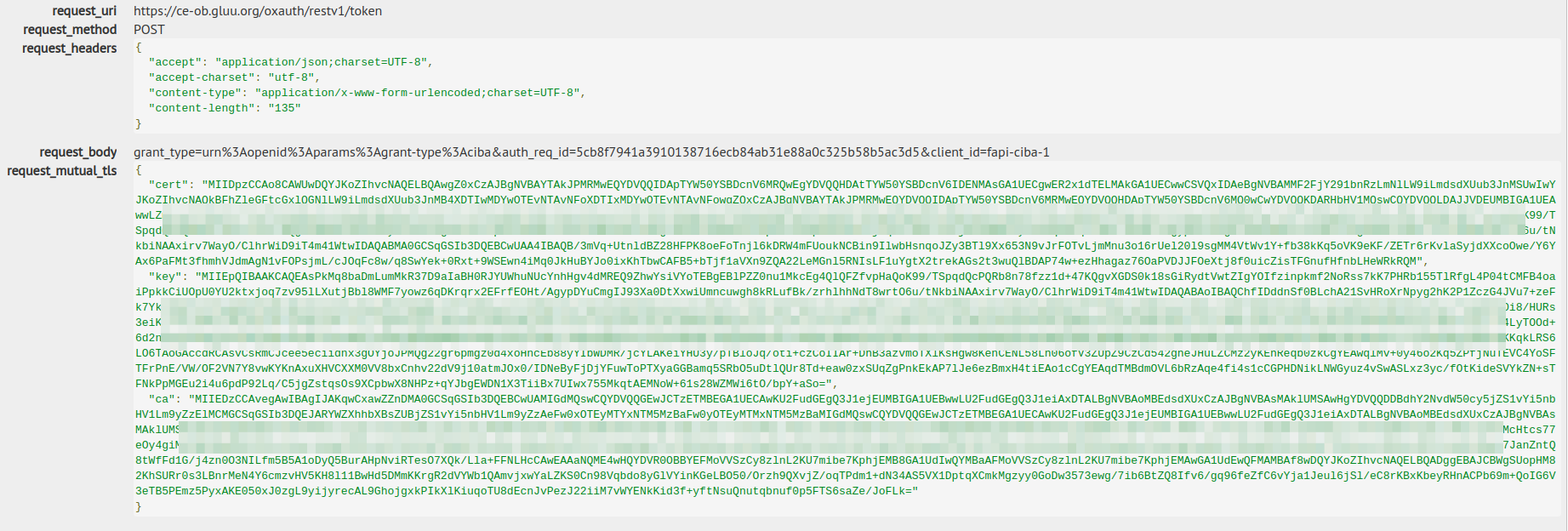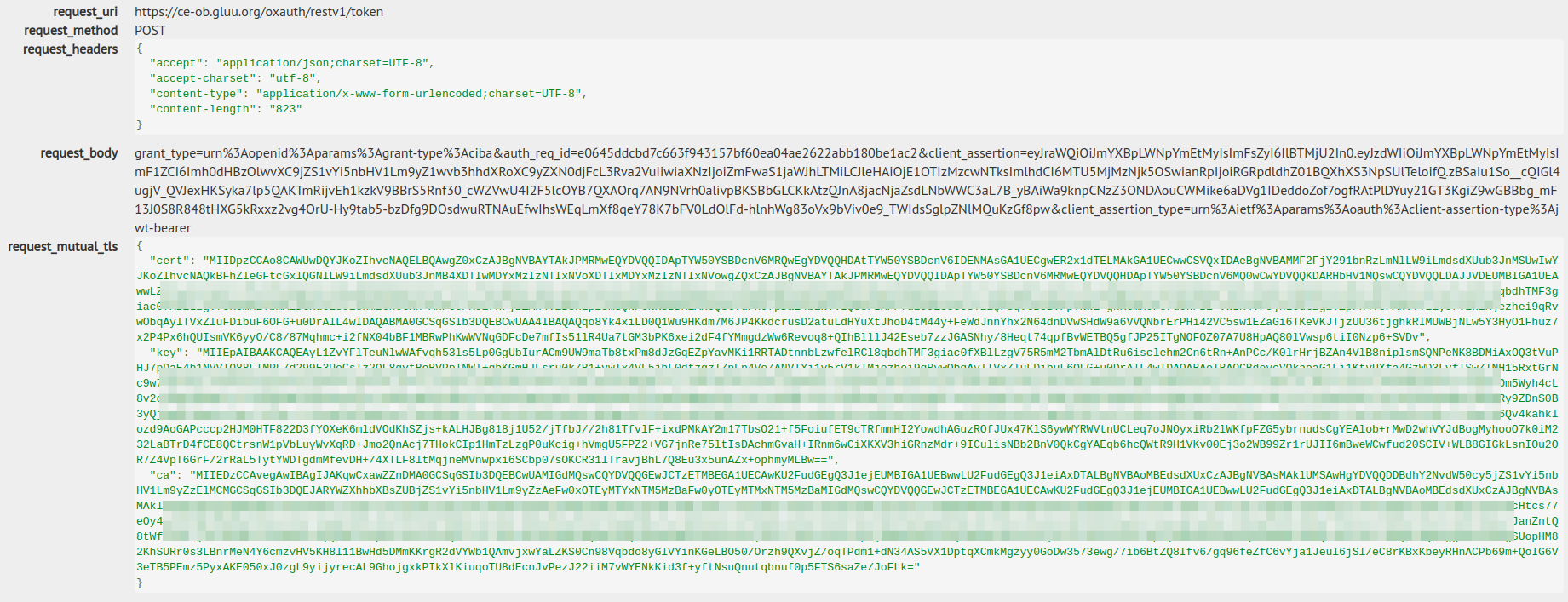Financial-grade API - Client Initiated Backchannel Authentication Profile (FAPI-CIBA)#
Financial-grade API is a REST API that provides JSON data representing higher risk data. These APIs are protected by the OAuth 2.0 Authorization Framework.
Gluu Server supports and it's also certified as a FAPI implementation by OpenID, more info about the certification here and it supports a higher level of security about endpoints responsible to process authentication and authorization.
All specs about FAPI profile you can find here: https://openid.net/specs/openid-financial-api-part-2-ID2.html
Client Initiated Backchannel Authentication is an authentication flow in which RPs, that can obtain a valid identifier for the user they want to authenticate, will be able to initiate an interaction flow to authenticate their users without having end-user interaction from the consumption device. The flow involves direct communication from the Client to Gluu Server without redirect through the user's browser (consumption device).
Gluu Server is also certified as a CIBA implementation, more info about the certification you could see here.
About CIBA implementation is highly recommended to see this another page, since it contains some fundamentals features that are very important to understand this document: CIBA
All specs about CIBA profile you could find here: https://openid.net/specs/openid-client-initiated-backchannel-authentication-core-1_0.html
More information about FAPI-CIBA profile here: https://openid.net/specs/openid-financial-api-ciba-ID1.html
CIBA Token Delivery Modes#
The push mode is not permitted by this specification as it delivers tokens to the client by calling an endpoint owned by the client. This substantially differs from the established pattern of retrieving tokens by presenting client authentication to the token endpoint, and it may have security concerns that are currently unknown.
The poll and ping modes both follow the established convention of retrieving tokens from the token endpoint and hence do not have this concern.
The ping mode delivers a notification to an endpoint owned by the client. The information contained in this notification is limited to the auth_req_id for the request. The bearer token used by the authorization server to access this resource is not sender constrained.
Security Considerations#
TLS#
All connections to the server should use the following TLS configuration:
- TLS version allowed MUST be 1.2 or higher.
- TLS server certificate should be configured also.
- TLS cipher suites are:
- TLS_DHE_RSA_WITH_AES_128_GCM_SHA256
- TLS_ECDHE_RSA_WITH_AES_128_GCM_SHA256
- TLS_DHE_RSA_WITH_AES_256_GCM_SHA384
- TLS_ECDHE_RSA_WITH_AES_256_GCM_SHA384
Algorithms#
In order to sign correctly JWT, it only can use PS256 and ES256 algorithms. It's not allowed to use any other algorithm and also it's not allowed to use none.
Client Authentication#
FAPI-CIBA implementation supports two types of client authentication, Mutual TLS and Private Key JWT and ciba authorization endpoint can use any of them, of course this should be configured in the client registration also.
Mutual TLS#
In this kind of authentication, client should send a certificate to the server that is only issued for that specific client and it also includes client_id in the CIBA request. Gluu Server with MTLS is configured using Apache which is deeply explained in the next link:
https://www.gluu.org/docs/gluu-server/4.0/fe/mtls/
Using client certificate server should authenticate that client and after that Gluu Server check the JWT sent by the client to get all information about the CIBA request.
Example:

Private Key JWT#
This kind of authentication also uses a client certificate in order to validate every request and authenticate the client, however it also uses two new parameters in the request, which are:
- client_assertion_type for this profile, it always has the value urn:ietf:params:oauth:client-assertion-type:jwt-bearer
- client_assertion This is also a JWT containing some information about the client.
Example:
Encoded:
eyJraWQiOiJmYXBpLWNpYmEtMyIsImFsZyI6IlBTMjU2In0.eyJzdWIiOiJmYXBpLWNpYmEtMyIsImF1ZCI6Imh0dHBzOlwvXC9jZS1vYi5nbHV1Lm9yZyIsImlzcyI6ImZhcGktY2liYS0zIiwiZXhwIjoxNTkyMzM3MDU5LCJpYXQiOjE1OTIzMzY5OTksImp0aSI6IllOaVg4UkJIYWlyUHhQclJuZzZYIn0.eH9-jCdGHkT2rCX7lMki68kKwPtDvRRkAA7mqC33sHk16xt3vuVDEqAr3nAXL7bG3y2l9mtTZWXM9kNF07GQgBezqCr-J43TUIpX2XVCQWx2_xdD5ioxm2RVVf_Qc5xx5PU-RsdSMTuGCiKm1orrBQziMxJRHoaMWZSFkr8rXtNPUqhX_jMY5Qj3qFtL81Sod2JEayd1oV4jsM_uxT7sljTWQD3fa7q0q6EogEkuCCG5iGj6Jj8-dLNBJNNnAY2NatlXUGoGGmciwKQkwSKG8eOHjYs9llghJ-blKGbT-ePp_Vcs1BfFsfBMfkUd-7RJ1DsKekNOF4b5BzwxzcpnWQ
Decoded:
HEADER
{
"kid": "fapi-ciba-3",
"alg": "PS256"
}
PAYLOAD
{
"sub": "fapi-ciba-3",
"aud": "https://ce-ob.gluu.org",
"iss": "fapi-ciba-3",
"exp": 1592337059,
"iat": 1592336999,
"jti": "YNiX8RBHairPxPrRng6X"
}

Authentication Request#
After client authentication using any of those client authentication modes commented above, every request MUST contain the request parameter containing the JWT with all information about the CIBA request, these claims are:
- aud The Audience claim MUST contain the value of the Issuer Identifier for the OP, which identifies the Authorization Server as an intended audience.
- iss The Issuer claim MUST be the client_id of the OAuth Client.
- exp An expiration time that limits the validity lifetime of the signed authentication request.
- iat The time at which the signed authentication request was created.
- nbf The time before which the signed authentication request is unacceptable.
- jti A unique identifier for the signed authentication request.
The signed authentication request JWT is passed as an application/x-www-form-urlencoded HTTP request parameter. Authentication request parameters MUST NOT be present outside of the JWT, in particular they MUST NOT appear as HTTP request parameters. Additional HTTP request parameters as required by the given client authentication method, however, MUST be included as application/x-www-form-urlencoded parameters (e.g. Mutual TLS client authentication uses client_id while JWT assertion based client authentication uses client_assertion and client_assertion_type).
Example:
Encoded:
eyJraWQiOiJmYXBpLWNpYmEtMyIsImFsZyI6IlBTMjU2In0.eyJhdWQiOiJodHRwczpcL1wvY2Utb2IuZ2x1dS5vcmciLCJsb2dpbl9oaW50IjoidGVzdF91c2VyIiwibmJmIjoxNTkyMzM2OTk5LCJzY29wZSI6Im9wZW5pZCIsImlzcyI6ImZhcGktY2liYS0zIiwiYmluZGluZ19tZXNzYWdlIjoiMTIzNCIsImV4cCI6MTU5MjMzNzI5OSwiaWF0IjoxNTkyMzM2OTk5LCJqdGkiOiI2NTl2N2pwT3BlWkVLUE1oSlU4RiJ9.BK8VzIlhtm_apeQBH9yiigZfsaBlWrS_N78uy4cBJo5NAibFbvKMd7jIgepWK2SskD5w0RxuXvf7QZ8ndsR4HQPjZx3rvtm_ZtfqC0YLeZjwNYqpyD0YExhf0PV2wEgZCcoExbIUrFdHJV79C6R1yzA1kwfFF5JAqknPpqE3jqOufLrBAbPR7XPsA1b_9FUFRkIuvnGOjIG7sA2qT0-ADWC9KFUUEqDOPUj-MjjHjhS_Ik-e1lH1YouNYgTXiSefnIT_Uw9gYBNRqDFKUDvoz-uIViiAFzokbUpbigGHJ-UCPo1l6SFJ3hlabSfDnARn--hwRsj7G8FJ1it11cmk4g
Decoded
HEADER
{
"kid": "fapi-ciba-3",
"alg": "PS256"
}
PAYLOAD
{
"aud": "https://ce-ob.gluu.org",
"login_hint": "test_user",
"nbf": 1592336999,
"scope": "openid",
"iss": "fapi-ciba-3",
"binding_message": "1234",
"exp": 1592337299,
"iat": 1592336999,
"jti": "659v7jpOpeZEKPMhJU8F"
}
Authentication Response#
Response will be send in the same way that it's defined in CIBA documented linked here.
Successful Example:
HTTP/1.1 200
Cache-Control: no-store
Content-Length: 116
Content-Type: application/json
Server: Jetty(9.4.19.v20190610)
{ "auth_req_id": "e0645ddcbd7c663f943157bf60ea04ae2622abb180be1ac2", "interval": 2, "expires_in": 300 }
Failed Example:
HTTP/1.1 400
Content-Length: 245
Content-Type: application/json
Server: Jetty(9.4.19.v20190610)
{
"error_description": "The request is missing a required parameter, includes an invalid parameter value, includes a parameter more than once, contains more than one of the hints, or is otherwise malformed.",
"error": "invalid_request"
}
Token Request#
Token request MUST use the client authentication mode configured for the client and the response will be the same as defined in CIBA document.
MTLS Request:
POST /oxauth/restv1/token
content-type: application/x-www-form-urlencoded
accept: application/json
grant_type=urn%3Aopenid%3Aparams%3Agrant-type%3Aciba&auth_req_id=5cb8f7941a3910138716ecb84ab31e88a0c325b58b5ac3d5&client_id=fapi-ciba-1

Private Key JWT Request:
POST /restv1/token
content-type: application/x-www-form-urlencoded
accept: application/json
grant_type=urn%3Aopenid%3Aparams%3Agrant-type%3Aciba&auth_req_id=e0645ddcbd7c663f943157bf60ea04ae2622abb180be1ac2&client_assertion=eyJraWQiOiJmYXBpLWNpYmEtMyIsImFsZyI6IlBTMjU2In0.eyJzdWIiOiJmYXBpLWNpYmEtMyIsImF1ZCI6Imh0dHBzOlwvXC9jZS1vYi5nbHV1Lm9yZ1wvb3hhdXRoXC9yZXN0djFcL3Rva2VuIiwiaXNzIjoiZmFwaS1jaWJhLTMiLCJleHAiOjE1OTIzMzcwNTksImlhdCI6MTU5MjMzNjk5OSwianRpIjoiRGRpdldhZ01BQXhXS3NpSUlTeloifQ.zBSaIu1So__cQIGl4ugjV_QVJexHKSyka7lp5QAKTmRijvEh1kzkV9BBrS5Rnf30_cWZVwU4I2F5lcOYB7QXAOrq7AN9NVrh0alivpBKSBbGLCKkAtzQJnA8jacNjaZsdLNbWWC3aL7B_yBAiWa9knpCNzZ3ONDAouCWMike6aDVg1IDeddoZof7ogfRAtPlDYuy21GT3KgiZ9wGBBbg_mF13J0S8R848tHXG5kRxxz2vg4OrU-Hy9tab5-bzDfg9DOsdwuRTNAuEfwIhsWEqLmXf8qeY78K7bFV0LdOlFd-hlnhWg83oVx9bViv0e9_TWIdsSglpZNlMQuKzGf8pw&client_assertion_type=urn%3Aietf%3Aparams%3Aoauth%3Aclient-assertion-type%3Ajwt-bearer

Token Response#
Response will be send in the same way that it's defined in CIBA documented linked here.
Successful Example:
HTTP/1.1 200
Cache-Control: no-store
Content-Length: 1122
Content-Type: application/json
Pragma: no-cache
Server: Jetty(9.4.19.v20190610)
{"access_token":"8cc0cb03-efdb-4545-a1dd-a5568bff6aa9","id_token":"eyJraWQiOiJlYTc4NDgxYy05OTJkLTRmN2UtYTkzMS03NjM2NTYyMzgwZjVfc2lnX3JzMjU2IiwidHlwIjoiSldUIiwiYWxnIjoiUlMyNTYifQ.eyJhdF9oYXNoIjoiNllLcGVKUlhHNldDZWcxTnY5QUVJZyIsImF1ZCI6IjEyMy0xMjMtMTIzIiwiYWNyIjoic2ltcGxlX3Bhc3N3b3JkX2F1dGgiLCJzdWIiOiJpRDUyZlN4TVh5YjNFRnNjR1d4TlUxZnB5UU9qQWlMY3RkSldFQk55M1BVIiwidXJuOm9wZW5pZDpwYXJhbXM6and0OmNsYWltOmF1dGhfcmVxX2lkIjoiNGJhMzVkNTM1YzhlOTllYTVkOWFhMTRiZDEzZDVkNDI2MDdlMzYyZmFlMWRmNTNhIiwidXJuOm9wZW5pZDpwYXJhbXM6and0OmNsYWltOnJ0X2hhc2giOiJianFrYS1tOS1xZnpacE1rUXB5cURBIiwiYW1yIjpbIi0xIl0sImlzcyI6Imh0dHBzOi8vdGVzdC5nbHV1Lm9yZzo4NDQzIiwiZXhwIjoxNTkyODc0MDUyLCJpYXQiOjE1OTI4NzA0NTIsIm94T3BlbklEQ29ubmVjdFZlcnNpb24iOiJvcGVuaWRjb25uZWN0LTEuMCJ9.AtVs_PAsk8-O1jhPwsSIOqaCcDmc1lfE8gY2zgngyJf-ryC7HbhWuOQ_FcwVSHu9Og0Q9DqhTiOLAgeF6C2yHu88o72Bb6AFYJnn8Fyb-hEya3oggQU7j3jdNQB15S-p15ERvNwdT9nSWyxfezeruhBRtaC676iUOMLk61N8HyM4jnadWeGiDUC-7L4ZfLSkMnI0gy3I0dLQ6wKwyuRXPWbZcmqimCKTrVSmBuRRjQ-JLFyaWn2quyki7tSlDpVZ_o_9zwIYLkiFW4Mc1gOAbg-Gz7jqyVb-drarWLNQJWXsqfF0JERk19lTjA1CGW9nbcwhcEnmbFCtYavOW_X8YQ","token_type":"bearer","expires_in":299}
Failed Example:
HTTP/1.1 400
Cache-Control: no-store
Content-Length: 90
Content-Type: application/json
Pragma: no-cache
Server: Jetty(9.4.19.v20190610)
{
"error_description": "authorization_pending",
"error": "authorization_pending"
}
Ping Callback#
Gluu Server will send the callback to the client notification endpoint depending on the status of the request already defined in CIBA document. It's important to keep in mind that the security considerations should be done also here, it means TLS version 1.2 and list of ciphers supported.
Request body will be done in the same way that is already defined in CIBA.
Example:
Content-Type: application/json
Authorization: Bearer ebq/mzAm_2H2sqcnogfc=
Server: Jetty(9.4.19.v20190610)
{"auth_req_id": "2dc59a83b2318d2486c61a1c8015472f11711a5bba3ec40d"}
Response of this request is not processed by Gluu Server based on specs.